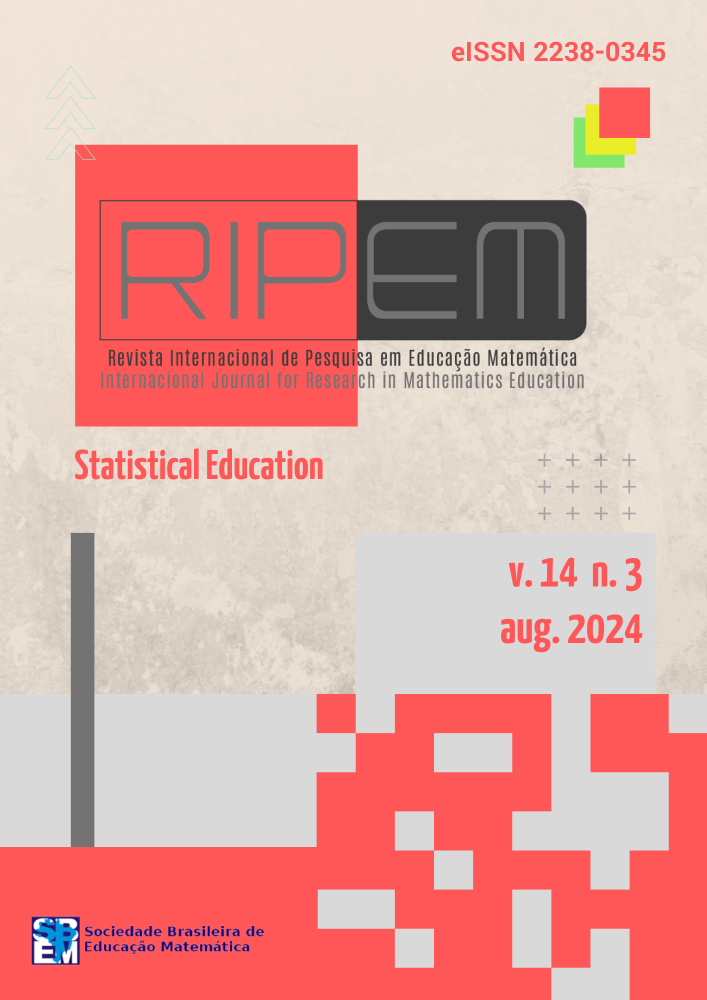Data science for informed citizen: Learning at the intersection of data literacy, statistics and social justice
DOI:
https://doi.org/10.37001/ripem.v14i3.3816Keywords:
Statistical Literacy, Data Science Education, Data Ethics, CitizenshipAbstract
Data science as a practical science has been conceived to address tangible problems in science, technology and society. Educating students in data science goes beyond teaching about algorithms, skills of manipulating data sets, selecting and applying appropriate analyses, and creating and interpreting visual representations of data. It also involves raising a critical understanding of how data are produced and how they can be used for particular purposes, including the role of context in interpreting data. It emphasizes developing an awareness for data ethics, and considering the implications for policy and society when powerful algorithms are used. Participation in democracy, in today’s digital and datafied society requires the development of a series of transversal skills which need to be fostered in educational institutions through critically oriented pedagogies that interweave technical data skills and practices together with statistical and media literacies. Based on an analysis of trends and needs to protect democratic values in a datafied society and on own reflections of teaching practices this paper gives recommendations on designing data science courses to develop informed citizen.
Downloads
References
Atenas, J., Havemann, L., & Timmermann, C. (2020). Critical literacies for a datafied society: academic development and curriculum design in higher education. Research in Learning Technology. 28: 2468. https://doi.org.10.25304/rlt.v28.2468
Biehler, R., & Fleischer, Y. (2021). Introducing students to machine learning with decision trees using CODAP and Jupyter Notebooks. Teaching Statistics, 43(S1), S133-S142. https://doi.org/https://doi.org/10.1111/test.12279
Breiman, L., Friedman, J.H., Olshen, R.A., and Stone, C.I. (1984). Classification and regression trees. Belmont, California: Wadsworth.
Dalton, C. M., Taylor, L., & Thatcher, J. (2016). Critical data studies: a dialog on data and space. Big Data and Society. 3 (1), 1–9. https://doi.org/10.1177/2053951716648346
Engel, J. (2017). Statistical literacy for active citizenship: a call for data science education. Statistics Education Research Journal 16(1), 44-49 https://doi.org/10.52041/serj.v16i1.213
Erickson, T., & Engel, J. (2023). What goes before the CART. Introducing classification trees with ARBOR and CODAP. Teaching Statistics, 45, S104–S113.
Finzer, W. (2019). Common Online Data Analysis Platform (CODAP). Concord: The Concord Consortium.
Gould, R. (2021). Towards data-scientific thinking. Teaching Statistics. 43, 11-22.
Helbing, D., Frey, B., Gigerenzer, G., Hafen, E., Hagner, M., Hofstetter, Y., van den Hoven, J., Zicari, R. & Zwitter, A. (2017). Digitale Demokratie oder Datendidaktatur. In: C. Ko?nneker (Ed.), Unsere digitale Zukunft. https://doi.org/10.1007/978-3-662-53836-4_1
Lengnink, K., Meyerhöfer, W. & Vohns, A. (2013). Mathematische Bildung als staatsbürgerliche Erziehung? Der Mathematikunterricht 59 (4), 2-7.
Messy Data Coalition. (2020). Catalyzing K-12 data education: A coalition statement. https://messydata.org/statement.pdf
OECD (2019). OECD Skills Outlook: Thriving in a Digital World. OECD Publishing, Paris. https://doi.org/10.1787/df80bc12-en
O'Neil, C. (2016). Weapons of Math Destruction: How Big Data Increases Inequality & Threatens Democracy. Crown Publishing Group.
Osborne, J. & Pimentel, D. (2019). Science, misinformation, and the role of education. Science, Vol 378, Issue 6617, 246-248. https://www.science.org/doi/10.1126/science.abq8093
ProCivicStatPartners (2018). Engaging civic statistics: a call for action and recommendations. A product of the procivicstat project. http://iase-web.org/islp/pcs
Richterich, A. (2018) The Big Data Agenda: Data Ethics and Critical Data Studies. University of Westminster Press, London. https://doi.org/10.16997/book14
Ridgway, J. (2015). Implications of the data revolution for statistics education. International Statistical Review https://doi.org/10.1111/insr.12110/full
Ridgway, J. (2022, Ed.). Statistics for empowerment and social engagement: teaching Civic Statistics to develop informed citizens. Springer.
Schield, M. (2004). Information Literacy, Statistical Literacy and Data Literacy. IASSIST Quarterly 28(2), 7-14. https://doi.org/10.29173/iq790
Schüller, K., Koch, H. & Rampelt, F. (2021). Data-Literacy Charta. https://www.stifterverband.org/data-literacy-charter
Shin, T. (2020). Real-life Examples of Discriminating Artificial Intelligence. Towards Data Science https://towardsdatascience.com/real-life-examples-of-discriminating-artificial-intelligence-cae395a90070
Silva, T. (2022). Racismo Algorítmico: inteligêcia artificial e discriminação nas redes digitais. Sesc Edições SP
Smith, H. (2020). Algorithmic bias: should students pay the price? AI & SOCIETY, 35(4), 1077– 1078. https://doi.org/10.1007/s00146-020-01054-3
Van Es, K. & Schäfer, M. T. (Eds). (2017) The Datafied Society: Studying Culture through Data. Amsterdam University Press. http://library.oapen.org/handle/20.500.12657/31843
Wolfram, C. (2020). The math(s) fix: An education blueprint for the AI age. Wolfram Media
Published
How to Cite
Issue
Section

This work is licensed under a Creative Commons Attribution-NonCommercial-ShareAlike 4.0 International License.








